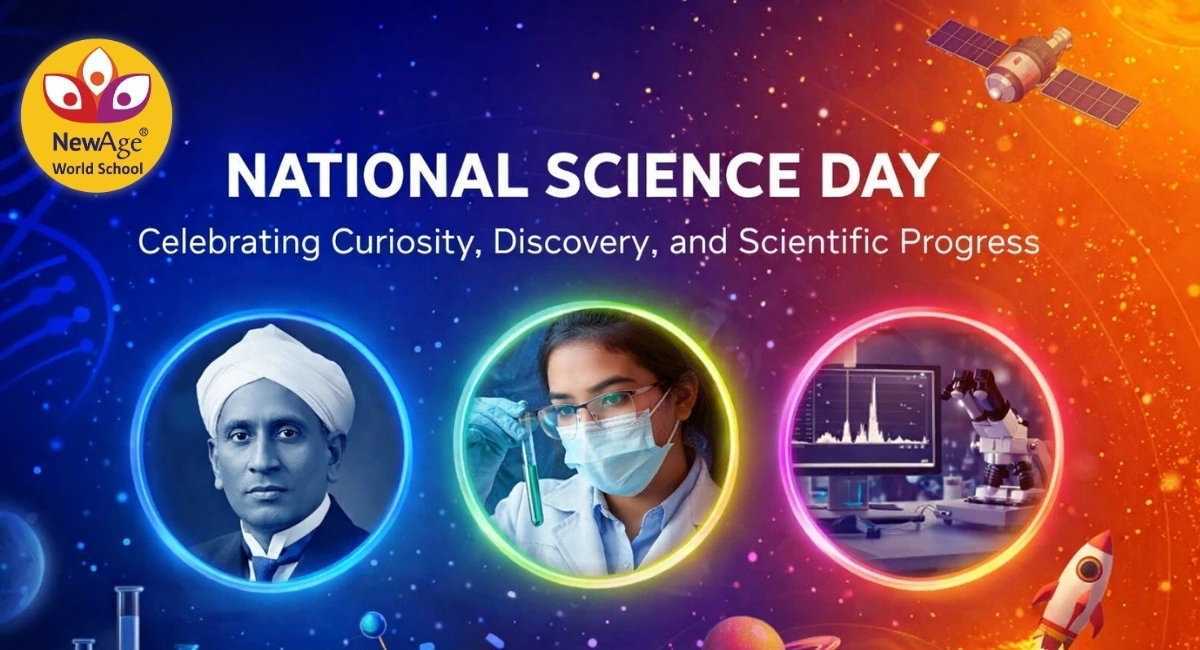The Role of Science Education in International Schools: Nurturing Future Innovators at NewAge

Table of content
- Introduction
- The Importance of Science Education in International Schools
- Hands-On Learning: Making Science Fun and Engaging
- Inquiry-Based Learning: The Heart of Scientific Exploration
- The Objectives of Teaching Science in Schools
- Understanding the Nature of Science
- Why Choose NewAge World School for Science Education?
- Conclusion
- FAQ
Introduction
Science is all around us, shaping the way we understand the world, solve problems, and innovate for a better future. It is undeniable that science plays a critical role in our lives and education.
In this blog, we will explore why science is important for students and how it fosters curiosity, creativity, and critical thinking. We will also discuss how schools, especially ICSE Schools in North Bangalore, are transforming science education to nurture future innovators.
You will discover how hands-on activities, inquiry-based learning, and a strong science curriculum are helping students build essential life skills. By the end, you will see why choosing the right school for your child’s science education can make all the difference.
With that, let us dive into the fascinating role of science in shaping young minds!
The Importance of Science Education in International Schools
Why is science important for students? It is simple—science fuels curiosity. It encourages children to ask "why" and "how" about the world around them. This questioning mindset helps students think critically, solve problems creatively, and develop skills they will use throughout their lives.
At ICSE Schools in North Bangalore, such as NewAge World School, science is more than just a subject. It is a way of understanding the universe and making sense of everyday life. By introducing children to scientific research and advancement, international schools equip them with the tools to face challenges and innovate.
Hands-On Learning: Making Science Fun and Engaging
Science is best learned through experience. Hands-on learning in science allows students to engage directly with experiments and activities. For example, observing a chemical reaction or building a simple machine creates excitement and a deeper understanding of concepts.
At NewAge World School, students enjoy learning in state-of-the-art learning labs. These labs provide opportunities to explore, experiment, and discover, making science lessons exciting and interactive. Activities like building models, conducting experiments, or creating solutions for real-world problems help students retain knowledge better than traditional lectures.
Inquiry-Based Learning: The Heart of Scientific Exploration
Curiosity drives inquiry. Science thrives when students ask questions like, "Why do we have day and night?" or "How does a plant grow?" These questions lead to exploration and discovery, which are central to science education in international schools.
Inquiry-based learning encourages students to think critically, investigate theories, and find answers themselves. This approach, used at NewAge World School, teaches students the process of inquiry, investigation, collecting evidence, and concluding. It also connects science education to life, showing students how science impacts the world around them.
The Objectives of Teaching Science in Schools
What is science education really about? According to frameworks like Cambridge and ICSE, it is about more than just passing exams. The key objectives include:
• Developing scientific knowledge and practical skills.
• Understanding and applying scientific concepts.
• Exploring the natural world through scientific research and advancement.
• Encouraging collaboration and teamwork.
Teaching science at the school level helps students build critical thinking, problem-solving, and analytical skills. Schools like NewAge World School follow a structured curriculum that ensures students not only learn but also enjoy science.
Understanding the Nature of Science
To truly appreciate science, one must understand how it works. The nature of science involves inquiry, observation, evidence, and evaluation. Students learn that science is not just about answers—it is about the process of finding those answers.
For instance, why is the sky blue? Why are there eight planets in the solar system? These questions lead to experiments and theories, which help students connect science education with the real world. At International Schools in Yelahanka, such as NewAge World School, this understanding is at the heart of their curriculum.
Why Choose NewAge World School for Science Education?
When it comes to choosing a school, parents look for a place that balances academic excellence with a focus on real-world skills. NewAge World School stands out among ICSE Schools in North Bangalore because of its dedication to holistic learning and innovation.
Here is why NewAge World School is the right choice for your child's science education:
1. Lab Infrastructure: The school offers world-class lab infrastructure equipped with modern tools for experiments and research.
2. Learning Labs: Dedicated learning labs ensure students have hands-on experience in science.
3. Qualified Faculty: Experienced teachers make science fun and engaging.
4. Innovative Curriculum: Lessons are designed to include interactive activities that encourage creativity and critical thinking.
The school's focus on science education in international schools ensures that students are ready to tackle global challenges while developing a love for learning.
Conclusion
Science is more than a subject; it is a way of life. Science education in international schools like NewAge World School equips students with the skills they need to succeed in the modern world. From hands-on learning in science to understanding the importance of science in schools, students grow into curious, innovative, and confident individuals.
By fostering inquiry, creativity, and a love for exploration, schools like NewAge World School not only teach science but also inspire the next generation of innovators and leaders. If you are looking for a school that prioritizes your child's future, consider the unique approach of NewAge World School.
Admissions are open for the academic session 2025-26 at NewAge World School. You can find more information about our school, curriculum, and admission on our official website.
Click here to apply now.
Frequently Asked Questions
What is the importance of science in schools?
Science teaches curiosity, creativity, and critical thinking, laying the foundation for future learning and innovation.
How do learning labs enhance education?
Learning labs provide hands-on experience, making concepts easier to understand and retain.
What is science education?
It’s the process of teaching scientific knowledge, inquiry skills, and real-world applications to students.
What makes NewAge World School stand out?
With its state-of-the-art lab infrastructure, innovative curriculum, and focus on hands-on learning, NewAge World School offers the best science education.
Why is science important for students?
Science helps students develop critical thinking, problem-solving, and analytical skills, which are essential for life.

















Leave a Reply
Your email address will not be published. Required fields are marked *
Comments
No comments available